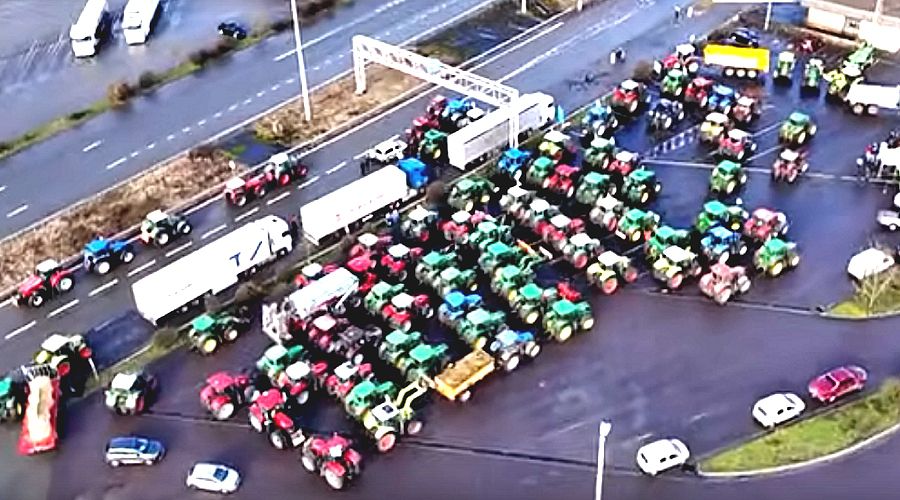UNDERSTANDING THE ANGER OF FRENCH FARMERS |
|
Faced with their growing unease, farmers decided to make themselves heard. On trailers and in livestock trucks, tanks, modular construction, generators and tents, farmers plan to set up camp and occupy certain highways in France “Do we still want to eat French?”, “farmers = realistic, administration = utopian”, or even: “Our end will be your hunger”. The complaints are pouring in. “With the increase in costs, cash flow is increasingly tight and even if prices have increased, we are far from the target.” “Unfair competition with imported products”, “stifling standards”, “colleagues who did not receive CAP aid on time”: The drivers are all ages, but the same fed up. Our demands ? Stop the excess of standards, and let's release income on our farms to allow young people to settle down and replace the 45% of farmers who will retire by 2030, summarizes Yannis Baltzer, president of the JA du Bas-Rhin. Note that debt and loss of competitiveness pushes, every day, a farmer to end his life... An alarming observation which crystallizes the agricultural situation and which endangers our food sovereignty. The French agricultural model under European supervision The decline in agricultural employment, the expansion of farms, motorization and the use of fertilizers and phytosanitary products characterize the major transformations of French agriculture since the 1950s. At the end of the war and in order to ensure the develop agricultural production, French agriculture thus came under the supervision of Europe thanks to the creation of the CAP, Common Agricultural Policy in 1962. To stimulate agriculture, 3 tools were created: import taxes, guaranteed prices for farmers and export refunds. The subsidies allocated by the CAP are distributed according to the following model: 70% of the subsidies are called "direct", in other words farmers receive "a basic income", calculated according to the operating area, regardless of the way in which production is carried out. The rest of the subsidies, co-financed by the member states, relate to rural development, that is to say additional support which aims to support farmers who implement environmentally friendly practices, who launch their activity or who suffer from a competitive disadvantage due to their geographical area. Fewer and fewer farmers, who are increasingly older By encouraging farmers to expand and gain competitiveness, it is natural that over the past 60 years, French agriculture has lost 80% of its farms and more than five million agricultural jobs. Today, French agricultural policy is therefore based on productivity thanks to the growing increase in large farms. And for good reason, in 2010, very large farms represented 33% of French farms compared to 67% in 2016. According to the 2020 agricultural census, there are around 389,800 farms in mainland France. That's 100,000 fewer than 10 years ago. On average, they extend over 14 additional hectares than in 2010. The proportion of operating farmers in France has declined sharply. If they represented 7.1% of total employment in 1982, they only accounted for 1.5% in 2019, or 400,000 people. They are considerably older than all employed people: 55% of them are 50 years old or over, compared to 31% for the rest of workers. Only 1% of them are under 25 years old. They also report a weekly working time well above that of all employed people: 55 hours per week on average, compared to 37 hours for the second group. Agriculture has always been an important sector even if it tends to decrease over the years, to represent 1.6% of the national GDP. At the European level, France is still the leading agricultural producer with a turnover of 70.7 billion euros in 2016, the second after Germany for the agri-food industry with 370 billion euros. A podium which risks being turned upside down by ever fiercer competitiveness and the arrival of other countries in the Union. The new free trade agreements [agreements between Canada and Europe, New Zealand, Morocco or Argentina] are further crushing farmers Increased competition from our European neighbors has greatly weakened the French agricultural situation. Agriculture today is no longer the same as yesterday. The peasant world, which has become a minority, even marginal, in France, sees its model completely disrupted. Increasing competition from our European neighbors has considerably weakened the French agricultural situation. Rightly so, an INSEE study since the 2000s reveals that the share of food imports has doubled, increasing the share of foreign dishes on the plate of a French citizen to 20%. Food products, although imported, are undeniably more affordable. For several years, France has adopted a policy focused on consumer purchasing power, conditioning them to opt for lower-cost purchases. When we consider that the hourly cost in Poland is four times lower than that in France, the competition becomes fierce despite the lightness of their environmental and health standards. Due to a lack of profitability, France has thus relegated part of its crops. Faced with this competition, many French farmers have embarked on a race for profitability and expansion, forcing them to invest massively in equipment that meets their needs. new needs. These colossal investments have led most farmers into a vicious spiral of debt, from which few have managed to emerge. A colossal burden, knowing that in 2017, nearly 20% of farmers did not receive any income... Today, the agricultural world is in the grip of an economic, but also social, crisis. In addition to financial pressure from production changes, farmers face unprecedented moral pressure. Consumers have been questioning conventional agriculture based on petrochemicals for several years, in favor of organic agriculture that respects life. “Farm bashing,” or the denigration of traditional agriculture, has become commonplace, undermining the trust we place in our farmers. |
|
| Alyson Braxton for DayNewsWorld | |
 |
|




